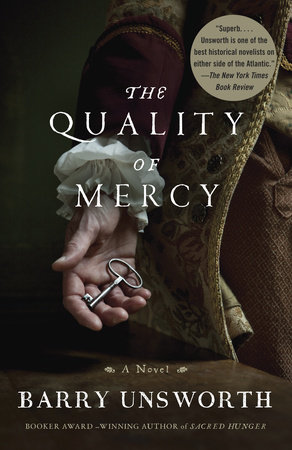The Quality of Mercy Reader’s Guide
By Barry Unsworth


1. Barry Unsworth takes his title from Shakespeare’s The Merchant of Venice—the scene in which Portia tells the vengeful moneylender Shylock: “The quality of mercy is not strained / It droppeth as the gentle rain from heaven / Upon the place beneath. / It is twice blessed: / It blesseth him that gives and him that takes.” Why would Unsworth reference Shakespeare’s play in his title? At what key moments in the novel does mercy prevail over vengeance? Why, for example, does Kemp decide not to apprehend Sullivan?
2. What is the effect of telling the story through multiple points-of-view—of getting inside the minds of all the main characters rather than having one perspective dominate?
3. The novel opens with Sullivan dragging a drunken man out of harm’s way, then robbing him of most of his money. He begins to walk away, but decides that he should rob the man of all his money, his boots and his coat, so that the lucky fellow will not “go through life feelin’ convicted of ingratitude” for Sullivan’s good deed. In what ways does this very humorous scene set up some of the novel’s major themes? What other characters contrive to mask their own self-interest as generosity?
4. What makes Sullivan such an engaging character? How does he interpret his sudden changes in fortune, both good and bad? Why is he so trusting?
5. What role do vows play in the novel? What motivates both Sullivan and Kemp to keep their vows? Is Jane right in saying that Kemp fulfilled his vow to his father simply by sharing it with her? How does sharing that vow affect him?
6. Sullivan says of James Bordon that he was the only one, of all those who heard the story of Billy Blair, that “had the power of sharin’. The sister was grateful an’ the others took an interest, but he was other only one could touch it in his mind…. And the reason for that, the reason for that sharin’, lies in the power of imagining’ a thing that you have niver lived through. It is the power of imaginin’ that makes a man stand out, an’ it is rarer than you might think. It is similar to the power of music” (p. 262). In what important ways is the novel about the power of sharing and imaginative empathy? How is sharing similar to music? Does Kemp acquire this power by the novel’s end?
7. Why are the former slaves and the mutinous crew of the laplander able to live more or less as equals after their shipwreck in Florida?
8. In what ways does Kemp change over the course of the novel? How does his character grow more complex as more of his motivations and his family history is revealed? What do the surprising decisions does he makes, regarding Sullivan and Michael Bordon, say about him?
9. How are the wealthy—Lord Spenton and Erasmus Kemp particularly—depicted in the novel? How do they regard those beneath them in the social order? How do they view each other?
10. Both Jane and her brother Frederick Ashton want to effect real change in the world, to abolish slavery and improve the lives of the oppressed. How do they differ in terms of their motives and strategies?
11. In a series of cynical observations about how he manipulated the jury through their fear of mob rule, the lawyer Pike thinks of Kemp: “Propriety and property, those were his guiding lights” (p. 204). How are property and propriety related? What does Lord Spenton do with the common lands once they become his property? In what different ways do Kemp and Bordon view the property of the Dene? What are the legal and moral ramifications of regarding slaves as merely another form of property?
12. What arguments do Ashton’s lawyers use to abolish the legal grounds for slavery? Why are they ultimately successful?
13. When Jane tells Kemp that she hopes Michael Bordon will keep the land Lord Spenton has given him and cultivate it as his father would have done, Kemp responds with a “smile of indulgence for sentiments that only ignorance of the world could account for”—a smile which Jane had seen on other men’s faces when she had expressed her enthusiasm for what were considered eccentric causes (p. 293). What does this subtle exchange reveal about how women were regarded in 18th century England?
14. Even though she is powerfully attracted to Kemp, Jane hesitates and considers his marriage proposal very carefully. What are her concerns? What ultimately sways her?
15. The Quality of Mercy is very much about a specific time and place, England in 1767. What is most surprising about the portrait Unsworth paints of this particular historical moment? In what ways does the novel hold a mirror up to our own times?
Just for joining you’ll get personalized recommendations on your dashboard daily and features only for members.
Find Out More Join Now Sign In